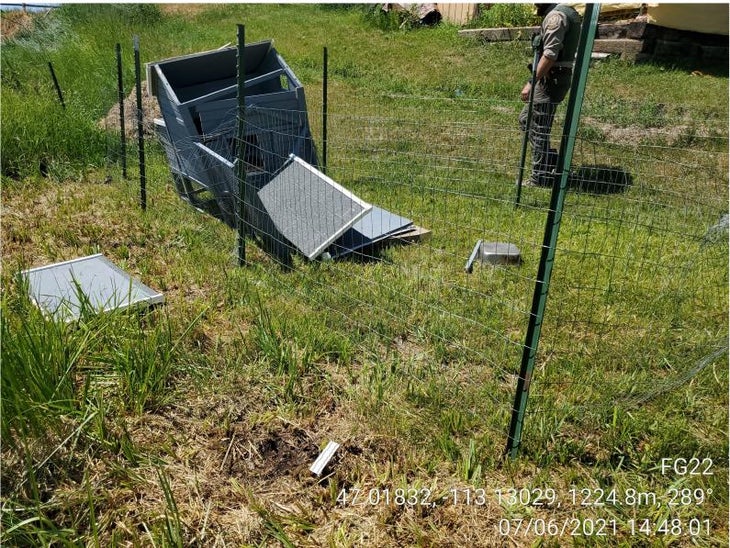Products You May Like
Get full access to Outside Learn, our online education hub featuring in-depth fitness, nutrition, and adventure courses and more than 2,000 instructional videos when you sign up for Outside+
Sign up for Outside+ today.
A California woman who was fatally attacked by a grizzly bear in Ovando, Montana, last July was a rare victim of a predatory, food-conditioned bear, according to an incident report by the Interagency Grizzly Bear Committee’s Board of Review released this month.
Leah Davis Lokan, 65, was on a multiday cycling trip with her sister and her friend when they decided to stop in Ovando for the night on July 5, 2021. This western Montana town is a popular stop along Tour Divide, an annual self-supported bike race that traverses the length of the Rocky Mountains. About 1,000 grizzlies live in the forest that borders Ovando, and historically, locals have worked to develop ways to minimize wildlife danger in the town.
Lokan’s sister and friend decided to spend the night in a hotel, but she camped behind a museum with Kim and Joe Cole, a Texas couple she’d met on the trip. Around 3 AM on July 6, Lokan woke up to a 417-pound grizzly roaming the campsite. She alerted the couple, and the three of them left their tents, made noise, and scared off the bear. At the time, Lokan said “the bear huffed at my head,” according to the committee’s incident report. She declined the Coles’ offer to sleep at a hotel for the rest of the night. Once the bear left the area, Lokan removed packaged snack foods and dried lentils from her tent, grabbed her bear spray, and went back to sleep.
About an hour later, Joe woke to the sound of the grizzly “pouncing up and down” on Lokan and her tent, according to the incident report. Joe and Kim sprayed bear spray and yelled to stop the attack. As Joe approached closer with spray, the grizzly made eye contact with Joe, averted its head, and left. Joe and Kim immediately called emergency responders, and after attempts to perform CPR and deploy an AED, Lokan showed no sign of life.
The committee noted that predatory attacks are rare, and investigators don’t know how, why, or when this bear developed such instincts. But, there were some potential contributing factors: Even though Lokan removed food from her tent, she kept her toiletries inside—they were in recycled dried blueberry bags, which still carried a berry smell. Also, Lokan stored numerous food items in her bicycle’s saddlebag, just 10 feet from her tent. The committee added that the bear could have approached the campsite because of lingering food scents from Fourth of July celebrations the previous day.
Bruins can become food-conditioned when they learn to seek out human food instead of natural food in their habitat. Bears are opportunistic eaters that need a lot of calories, so they’ll eat what they can find. If bears become conditioned for human food, they might go to great lengths to find it, including harming humans. These food-conditioned bears are becoming more and more of a concern in popular camping and hiking areas. Once bears become conditioned, wildlife officials struggle to deter this eating and foraging behavior.

Hours before the mauling, a grizzly ripped the door off an unoccupied trailer about 4 miles west of Ovando. Minutes after attacking Lokan, a grizzly—presumably the same that was at the trailer—stormed a chicken coop just 215 yards from the campsite. Two days later, a grizzly raided another chicken coop 5 miles east of town. The designated bear management team set up traps near that second coop, and the next day, when the bear returned, wildlife service agents shot and killed it. DNA tests confirmed it was the same bear that killed Lokan.
Coroners identified deep lacerations to Lokan’s head, neck, shoulders, and back, and several bite marks through her shirt. Investigators found several bite marks and tears through the tent as well. In a July 2 entry in a journal found in Lokan’s tent footprint, she wrote that she practiced deploying bear spray after seeing signs of bear activity in and around her Seeley Lake, Montana, campsite.
If you’re camping in bear country, follow these tips from the Interagency Grizzly Bear Committee:
- Keep food and any scented items (toiletries such as toothpaste, lotions, mint floss, etc.) at least 100 yards from tents.
- Don’t camp where you cooked food. Prepare and eat your meals at least 100 yards from your campsite.
- Never, ever feed wildlife, especially bears.
- Carry bear spray, and know how to use it.
- Don’t return to your tent if a bear has approached it while you were inside. Move to a building or hard-sided vehicle instead.
- Clap, yell, or blow horns to scare off bears in your area.
